|
|
|
Sort Order |
|
|
|
Items / Page
|
|
|
|
|
|
|
| Srl | Item |
| 1 |
ID:
101138
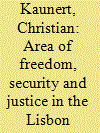

|
|
|
|
|
| Publication |
2010.
|
| Summary/Abstract |
Scholars may rightly claim the European Union's (EU) area of freedom, security and justice (AFSJ) has become one of the most significant developments in the European integration process. The Lisbon Treaty (LT) has the potential to push the AFSJ towards tremendous growth, and has provided the policy area with instruments that were unthinkable after the third pillar was created during the Maastricht Treaty negotiations. This article investigates the role of the European Commission in the process of constructing an 'AFSJ'. It argues that the Commission (through alliances with other institutional actors) managed to incrementally contribute to this shift in political norms. This shift derived from the policy-making level from 1999 onwards. It manifested itself specifically during the negotiations of the Constitutional Treaty (CT) and the subsequent re-negotiation of the LT. Here, the Commission acted with the support and the use of other supranational actors during the Convention, without which this result would have been difficult, if not impossible, to obtain. Firstly, the article will deal with the main advances of the CT which resulted in the LT. Subsequently, the role of the Commission and other EU institutional actors will be examined, resulting in an overall evaluation.
|
|
|
|
|
|
|
|
|
|
|
|
|
|
|
|
| 2 |
ID:
101144
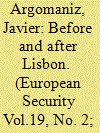

|
|
|
|
|
| Publication |
2010.
|
| Summary/Abstract |
Implementation has often been described as a key weakness affecting European Union (EU) counter-terrorism. However, this view is often adopted as a given and there has not been so far a systematic examination of the degree to which this represents an obstacle to the effectiveness of the EU response. This paper aims to contribute towards this goal through the use of primary sources in the study of the legal transposition of counter-terror instruments into national law, a key stage in the implementation process. It shows the presence of major implementation delays in this policy sector but, importantly, also significant cross-national variation with regards transposition failure associated with the administrative endowment of the individual member states. Furthermore, the mechanisms deployed by the Union to encourage a fluid implementation of European measures are critically evaluated and the potential impact in the process of the institutional transformations brought about by Lisbon is also examined.
|
|
|
|
|
|
|
|
|
|
|
|
|
|
|
|
| 3 |
ID:
101141
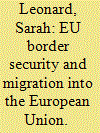

|
|
|
|
|
| Publication |
2010.
|
| Summary/Abstract |
This article examines the contribution of the activities of FRONTEX, the Agency in charge of managing operational cooperation at the external borders of the European Union (EU), to the securitisation of asylum and migration in the EU. It does so by applying a sociological approach to the study of securitisation processes, which, it argues, is particularly well-suited to the study of securitisation processes in the EU. Such an approach privileges the study of securitising practices over securitising 'speech acts' in securitisation processes. After identifying two main types of securitising practices in general, the article systematically examines the activities of FRONTEX and the extent to which they can be seen as securitising practices on the basis of these two (non-mutually exclusive) criteria. The article shows that all the main activities of FRONTEX can be considered to be securitising practices. The article therefore concludes that the activities of FRONTEX contribute to a significant extent to the ongoing securitisation of asylum and migration in the EU. It also highlights that this does not automatically make FRONTEX a significant securitising actor in its own right and that more research is needed on the relations between FRONTEX and the EU institutions, especially in the light of the current negotiations aiming to amend the founding Regulation of FRONTEX.
|
|
|
|
|
|
|
|
|
|
|
|
|
|
|
|
| 4 |
ID:
101145
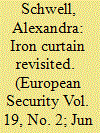

|
|
|
|
|
| Publication |
2010.
|
| Summary/Abstract |
Since 1990 draftees of the Austrian army have been stationed at the border to Hungary, and later to Slovakia, as a reaction to both the system change in Eastern Europe as well as the expected increase in cross-border crime. This so-called 'support deployment' was initially planned to last no longer than 10 weeks, but soon it became apparent that the military's border security deployment could also serve other ends than mere security goals. Since then it has been prolonged numerous times. In scrutinising the strategies of the various actors involved, the paper shows that the support deployment can be considered an act of securitisation and is as such almost entirely decoupled from the actual policing of the Schengen internal border. Furthermore, it argues to 'bring the audience back in' and to recognise the audience's agency in the analysis of securitisation processes.
|
|
|
|
|
|
|
|
|
|
|
|
|
|
|
|
| 5 |
ID:
101137
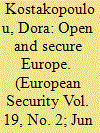

|
|
|
|
|
| Publication |
2010.
|
| Summary/Abstract |
he Lisbon Treaty's depillarisation of justice and home affairs (JHA) cooperation represents a major break from the past. It opens the way for the full involvement of the Commission, the European Parliament and the European Court of Justice, an involvement that is bound to influence the substantive scope, and perhaps liberalise, legal and policy output in the years ahead. A different form of cooperation in area of freedom, security and justice institutionally and substantively is digging out its space within the present, security-oriented and traditionally executive-driven architecture. The Stockholm Programme and the proposed Action Plan are a reflection of this. Present in them are aspects of the Hague Programme and the logic of control and surveillance. But there also exist vessels of less ideology-driven policies, pragmatic responses to JHA challenges and respect for citizens' rights, human rights and the rule of law. Whether the latter paradigm, which is wrapped up within the logic of security, remains confined and crammed in the next five years or will be given room to grow remains to be seen.
|
|
|
|
|
|
|
|
|
|
|
|
|
|
|
|
| 6 |
ID:
101139
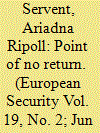

|
|
|
|
|
| Publication |
2010.
|
| Summary/Abstract |
The entry into force of the Treaty of Lisbon has raised new expectations in the area of freedom, security and justice (AFSJ). The extension of co-decision increases the capacity of the European Parliament (EP) to have an influence on decision-making. This article engages with securitisation theories in order to analyse the evolution of the AFSJ as well as the role of its main actors in the securitisation process. It evaluates the past role of the EP as well as the recent changes introduced by the extension of co-decision in order to establish whether it will become a new securitising actor or will have the potential for de-securitisation of the agenda. The macro-institutional changes in the Treaty of Lisbon indicate that the EP will have opportunities to de-securitise, although the emphasis on EU citizens' rights introduced in the Stockholm programme offers it a chance to appeal to domestic audiences at the expense of more diffuse issues such as immigration and asylum.
|
|
|
|
|
|
|
|
|
|
|
|
|
|
|
|
| 7 |
ID:
101143
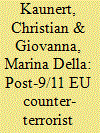

|
|
|
|
|
| Publication |
2010.
|
| Summary/Abstract |
The European Union counter-terrorist financing (EU-CTF) regime has experienced significant developments since 2001. This article builds on the notion of supranational policy entrepreneurship (SPE) in order to investigate the post-9/11 development of EU-CTF regime. Admittedly, counter-terrorism is a policy area in which supranational institutions have rarely taken the lead, nor consistently been very active. However, the article suggests that, despite the centrality that member states maintain in the policy-making process, European institutions, notably the European Commission and the Council Secretariat, have been significant in EU-CTF cooperation. While the European Commission and the Council Secretariat both played the role of an SPE, the article outlines the different ways in which this occurred. Empirically, the article challenges an intergovernmentalist perspective by examining the implementation of United Nations Security Council resolutions and Financial Action Task Force recommendations on countering terrorist financing at the EU level.
|
|
|
|
|
|
|
|
|
|
|
|
|
|
|
|
| 8 |
ID:
101140
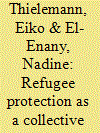

|
|
|
|
|
| Publication |
2010.
|
| Summary/Abstract |
Refugee protection efforts have been shown to suffer from substantial collective action problems due to the capacity of restrictive policy measures adopted by one region as a means of shifting refugee responsibilities to other regions. Such responsibility-shifting dynamics have been identified between north and south as well as within these regions. European Union (EU) cooperation on asylum and refugee policies has been criticised for facilitating the adoption of restrictive policy measures and the creation of a 'Fortress Europe'. Fears about the hollowing out of refugee standards have been coupled with concerns about the EU's free-riding on the refugee protection efforts of countries outside the EU. This paper shows that overcoming collective action problems between the Member States has indeed been a key motivation for EU cooperation in this area. However, a comparative analysis of EU asylum laws and refugee protection efforts with those of similar developed countries outside the EU leads to the rejection of some of the assumptions and implications of the 'Fortress Europe' thesis. While there is evidence of north/south burden-shirking and substantial room for improvement in the EU's asylum and refugee regimes, comparative legal research and the analysis of available UNHCR data on other OECD countries suggests that there is no evidence to support the claim that European cooperation has led to uniquely restrictive refugee policies and protection outcomes.
|
|
|
|
|
|
|
|
|
|
|
|
|
|
|
|
| 9 |
ID:
101142
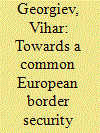

|
|
|
|
|
| Publication |
2010.
|
| Summary/Abstract |
The internal abolition of borders in the European Union (EU) has created a security deficit that is supposed to be compensated by inventing a new border - the 'external frontier' - which is to protect the combined territory of the Member States. This article argues that the security deficit has not been fully compensated for due to uneven policy implementation. The overview of impending threats to the EU border security system stemming from climate change impacts and demographic pressures shows that the future holds even greater challenges to the implementation of the Schengen acquis. A new approach to border security is urgently needed. The introduction of a common European border security policy can become an adequate response to many of the otherwise imminent threats.
|
|
|
|
|
|
|
|
|
|
|
|
|
|
|
|
|
|
|
|
|